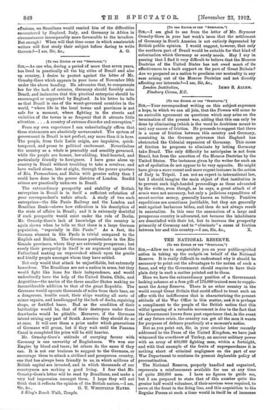[To TRY EDITOR or TIER "Srscriras."]
Sin,—Your correspondent writing on this subject expresses a hope, in which we can all join, that the Powers will come to an amicable agreement on questions which may arise on the termination of the present war, adding that this can only be done by eliminating (which is the word be doubtless meant to use) any causes of friction. He proceeds to suggest that there is a cause of friction between this country and Germany, consisting in the German grievance that England has obstructed the Colonial expansion of Germany. This cause of friction he proposes to eliminate by letting Germany take Brazil. The only difficulty he anticipates is not from Brazil, but from the assertion of the Monroe Doctrine by the United States. The instances given by the writer for such an act of spoliation do not appear to be very apposite. He might have given a more recent and more cogent instance in the action of Italy in Tripoli. I am not an expert in international law, but I should imagine the main object of that institution is to prevent such high-handed proceedings as those advocated by the writer, even though, as he says, a great attack vi et armis were not necessary, but only a judicious expenditure of secret-service money, generally known as bribery. Punitive expeditions are sometimes justifiable, but they are generally sent against barbarous tribes, and then do not always result in annexation. In this case the annexation of a large and prosperous country is advocated, not because the inhabitants are dissatisfied with their lot, but to increase the prosperity primarily of Germany and to " eliminate" a cause of friction between her and this country.—I am, Sir, &c., X.














































 Previous page
Previous page